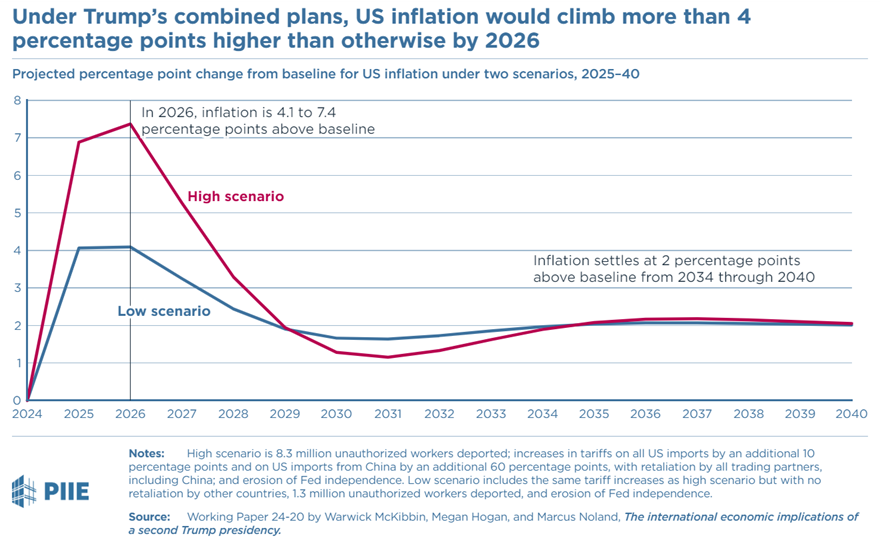Donald Trump will step into his second term as POTUS. However, analysts have raised concerns about Trump’s promises and their impact on the US economy.
Three economic policies in particular—tariffs, Bitcoin reserves, and immigration—could have significant consequences on inflation, growth, and stability. How can he make it work?
Trump needs to draw a cause-effect relationship
Returning President of the United States, Donald Trump has a massive task at hand—keep good his campaign promises while supporting the US economy. Analysts are closely watching the potential risks if Trump doesn’t think through.
The first would be to tame inflation without pulling down the economy. However, he claimed in the past that he would ‘end’ inflation while imposing import tariffs. Reports note that these added costs would increase the price of various goods. According to figures from the National Retail Federation, Americans can lose up to $78 billion due to these new tariffs.
And so results might be the opposite of what the 47th president wants. Former head of Obama Auto Task Force, Steven Rattner, says, “Trump’s plans to hike tariffs, deport millions, and erode central bank independence would send prices soaring,”

He believes it would add about 7.4% points to the US inflation. Added costs would put pressure on both individual consumers and businesses if the government implements fresh tariffs. Even if the incoming Trump administration decides to relax some taxation burden, it would potentially not offset the weight of higher prices. Trump thinks tariffs are the “greatest thing ever invented,” companies that depend on imports would not think so and simply pass on the cost to the customers.
As soon as Trump won the 2024 election, reports indicate that the wealthiest people have added billions to their fortune. During Trump’s first term as well, the tax reforms, specifically the Tax Cuts and Jobs Act (TCJA) of 2017, were said to largely beneficial for high-income groups. Trump might want to analyze better if the benefits are trickling down.
The economy should be the priority over promises
Secondly, Trump has emerged as a Bitcoin-supporting president-elect this election. Not only does he propose to make America the crypto capital, but Trump is also pushing for a “strategic reserve.” Meanwhile, Senator Cynthia Lummis has also proposed that the administration manage government borrowings through Bitcoin reserves to reduce the future debt by 50% over the next few years.
Gold has been a reserve. But, Trump will have to check Bitcoin’s feasibility about the national debt to play that role. Therefore, thepassing of the Bitcoin Act needs to be a separate issue for Trump. An issue that should not spill over to the administration’s debt planning.
Lastly, it is clear to the world that Trump’s re-election means an overhaul to the immigration policy. ACLU raises concerns about the militarization of deportations. Rights groups and refugee programs are likely on standby to oppose some anticipated restrictions. Workers in the US might see less friendly border policies. Economically, commentators believe that a cut in the labor force would directly impact the country’s growth. Stan Veuger, a senior fellow in economic policy studies at the American Enterprise Institute (AEI), explains that a smaller workforce would slow down overall employment growth by around 60,000 fewer new jobs each month in 2025.
On top of a creating a humanitarian disaster, Trump’s mass deportation plan would wreck the economy, drive up the cost of food and housing, and explode the deficit. pic.twitter.com/Qp5bvvikhr
— Robert Reich (@RBReich) October 23, 2024
Robert Reich, co-founder of Inequality Media says, “This could be both a humanitarian catastrophe and an economic disaster that would wreck the economy, drive up the cost of food and housing, and explode the deficit.” According to Reich, if undocumented workers, who do essential but low-paid jobs in farming, construction, and caregiving, were deported, it would create major challenges. Many of these industries depend heavily on these workers, so losing them would lead to labor shortages. Reich, who is a professor and political commentator, sees problems like food shortage, increased housing costs, and slowing GDP if these policies are implemented.
Trump’s second term offers an opportunity for him to strengthen the economy only if he avoids 3 pitfalls. Tariffs, if raised without caution, could increase inflationary pressure, hurting consumers. A strategic Bitcoin reserve might introduce volatility and add to national debt concerns. Tightening immigration could lead to labor shortages, slowing economic growth and affecting key sectors.





